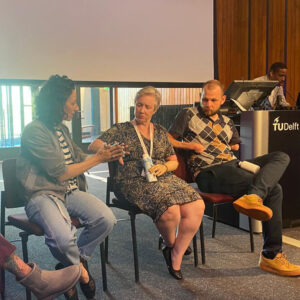
During a recent workshop at the IEEE World Haptics 2023 Conference assistant professor Edoardo Battaglia from the department of mechanical engineering flipped the script on the typical academic workshop. Rather than he and his colleague giving a presentation or tutorial, they brought in prosthetic users to teach the scientists about the everyday experiences of an upper limb prosthetics user.
Following the event, four of the five prosthesis users joined in as coauthors on a paper, sharing their specific experiences. That paper is now being published in Science Robotics, part of the Science family of journals, which covers the “latest technological advances and for the critical social, ethical and policy issues surrounding robotics.”
Initially, Battaglia and his collaborators tried to tease out common issues with upper limb prosthesis features through a survey. They discussed the outcomes of the survey during the panel, then asked those questions again to see if the discussion changed user’s minds.
“The main outcome was the need for a more nuanced analysis of the true needs of prosthetic users,” said Battaglia. “Not everybody wanted the same things specifically, but they all agreed that the current offering is lacking. Especially in terms of reliability and usefulness, weight, and ease of access. By including our panelists in the paper as co-authors we are hoping to pave the path towards a paradigm shift in the way that these systems are designed, where the design does not come only from engineers who know nothing about the day-to-day realities of being a prosthetic user.”
While this panel was a good starting point, Battaglia sees more work to be done on integrating the experiences with users into the work of scientists. More than half of the panelists were PhD holders, with reasonable sources of income, and they still identified struggles in getting the care that they need. One of those panelists pointed out that people with lower income and education levels struggle even more and are often not included in studies and are thus underrepresented, even though they are a big chunk of the people who need to technology.
“We were able to learn so much from the prosthetic user panelists,” said Battaglia, “both during the workshop and afterwards. They mentioned things that I would have never thought about. As an example, one of the panelists mentioned that she occasionally runs into trouble taking public transportation because her artificial hand looks like a real hand, but she has no feeling in it, so it will touch other people who are standing by without her realizing it. This is an example of a specific issue that we will never think of in lab settings but has an impact in her life.”
The full details and shared experience are included in the paper, which you can read here. You can learn more about Battaglia’s work at the Human Centered Haptics and Robotics Lab website.